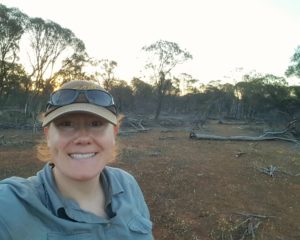About Me
Hello all! My name is Trace and I am currently a PhD candidate studying plant community ecology at the University of Queensland in Brisbane, Australia. I grew up in North Carolina, USA, and I got my undergraduate degree in Wildlife Biology and Fisheries at Colorado State University. Then, I spent about five years working seasonally in Colorado for the Long Term Ecological Research program on the shortgrass steppe and Colorado Parks and Wildlife on a prairie dog plague research program. Afterwards, I moved into a master’s program at the University of Wyoming in Botany, where I studied climate change impacts on habitat suitability for big sagebrush plant communities.
My research now focuses on the inclusion of higher-order interactions in coexistence modelling. I work with annual herbaceous understory plant communities of the York gum-jam woodlands of Southwest Western Australia. My field work includes mapping all individual plants in 50cm2 plots and collecting seeds from as many of those individuals as possible (we are still counting seeds from 2016, but the current number is at 612,019 seeds from 10,334 plants… ugh). I will use the seed count, species identity, and spatial mapping data to run individual fitness models. The importance of including functional trait data in coexistence studies is starting to emerge more and more throughout the literature; I want to continue this trend and include traits along with higher-order interactions in coexistence modelling. Last year, we collected data on 20 more mapped plots and gathered several trait measurements on most individuals in these plots. However, we are still uncertain what interesting questions we can ask and analyses we can perform using those traits. Thus, why I am excited to attend the course! My goal is to use the field and computational skills from this course to successfully integrate functional traits and higher-order coexistence modelling into my future work.
Climate Change
Assessing the knowledge and mood of society about climate change is difficult. I think that many older generations (of Peru, USA, and Australia) have noticed a marked increase in temperature and extreme climatic events throughout their lifetimes. Additionally, I think that many younger generations have accepted the current state of science about climate change and are in a position where they can implement change to help alleviate the effects of climate change (as it is their and future generations that will most strongly feel the effects). Additionally, those that work in land management in various forms (farmers, ranchers, land managers, etc) are more knowledgeable of the changes within their environment: they can tell that the flowers are blooming earlier or that there is less rain falling than past years. However, I think that in terms of public support and acceptance of humans being the cause of global climate change, there is still a ways for us to go; this lack of human-induced support will result in lack of policy change that would impact people’s current way of living.
In 2016, Australia cut funding and hundreds of climate scientists jobs (see: https://www.nytimes.com/2016/03/04/opinion/australia-turns-its-back-on-climate-science.html). The reason, I have heard broadly described as ‘We now know it is happening so why are we still researching it.’ The government has since tried to turn around its view but science organizations say it is not enough (http://www.smh.com.au/environment/climate-change/more-climate-scientists-urgently-needed-for-australia-academy-says-20170802-gxnp6m.html and https://theconversation.com/the-2017-budget-has-axed-research-to-help-australia-adapt-to-climate-change-77477). I have not had too much experience related to the public perceptions of climate change. However, last year there was an extreme drought year in Western Australia where I do my field work. In the local pub, there was talk of climate change since most of the residents were farmers and ranchers. That field season I saw many crops abandoned and used as pasture because there was no food (I also saw a lot of animals that had died in the fields because of lack of food and water). I, again, think that many people can perceive and understand that global climate patterns are shifting, however, most do not think that is it due to human causes and are unwilling to make personal changes and sacrifices to their lifestyle when the government refuses to highlight and acknowledge these issues.
PTFC3
I am excited for the opportunity to attend this course. The previous two sessions of the course aligned perfectly with the middle of my 3-month field seasons, not enabling me to attend. This year with a change in date and venue, I was enthusiastic to apply. This will be my first time attending any sort of international field course and am excited for the opportunities and challenges that await. Incidentally, it will also be the first time I will spend any length of time in a non-English speaking country, but I am delighted to experience the nature and culture of Peru. I hope that by the end of this course I will not only form connections with a fantastic group of students and established researchers with similar interests in functional trait ecology, but I will also gain an increased knowledge of functional trait collection and analysis. In addition, I am ecstatic to have the chance to broaden my worldview and have conversations about science and climate change not only within the course (with attendees from around the globe) but also the citizens of Peru.

Hi Trace! I’m looking forward to discussing traits and coexistence with you in Peru. I think both the functional trait literature and coexistence literature would benefit greatly from increased integration between these fields!